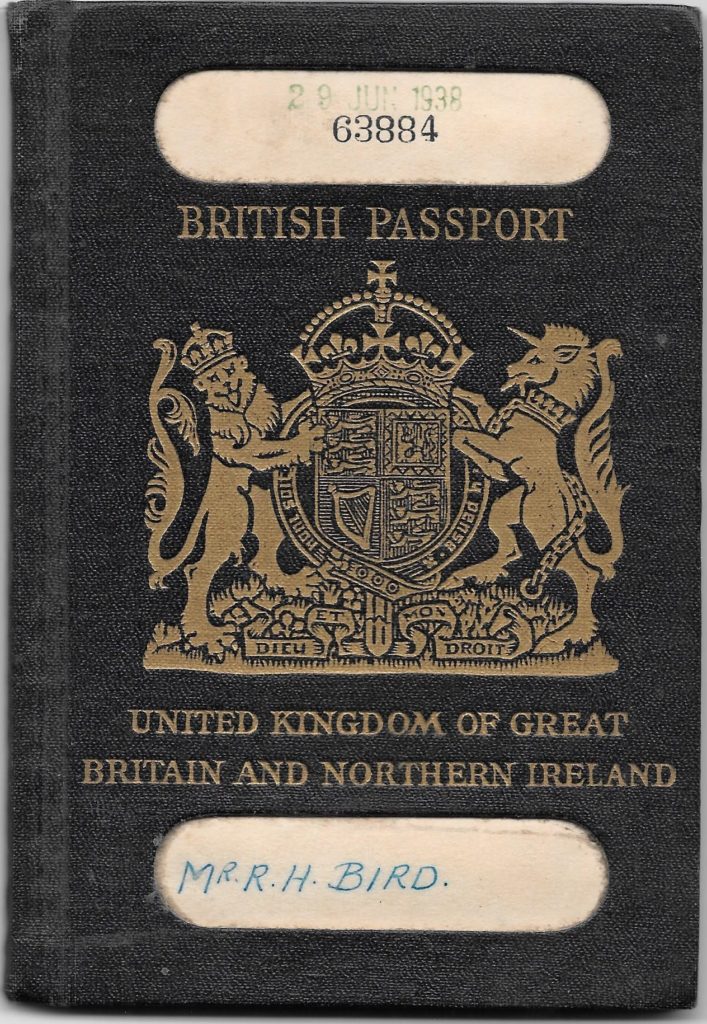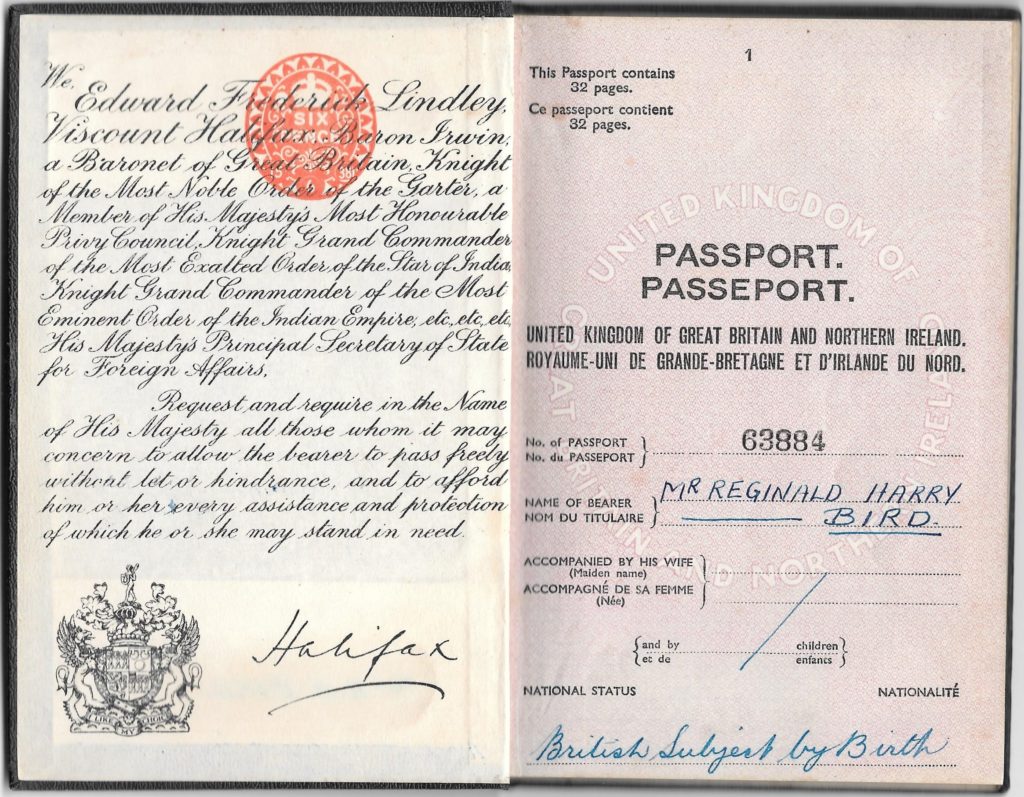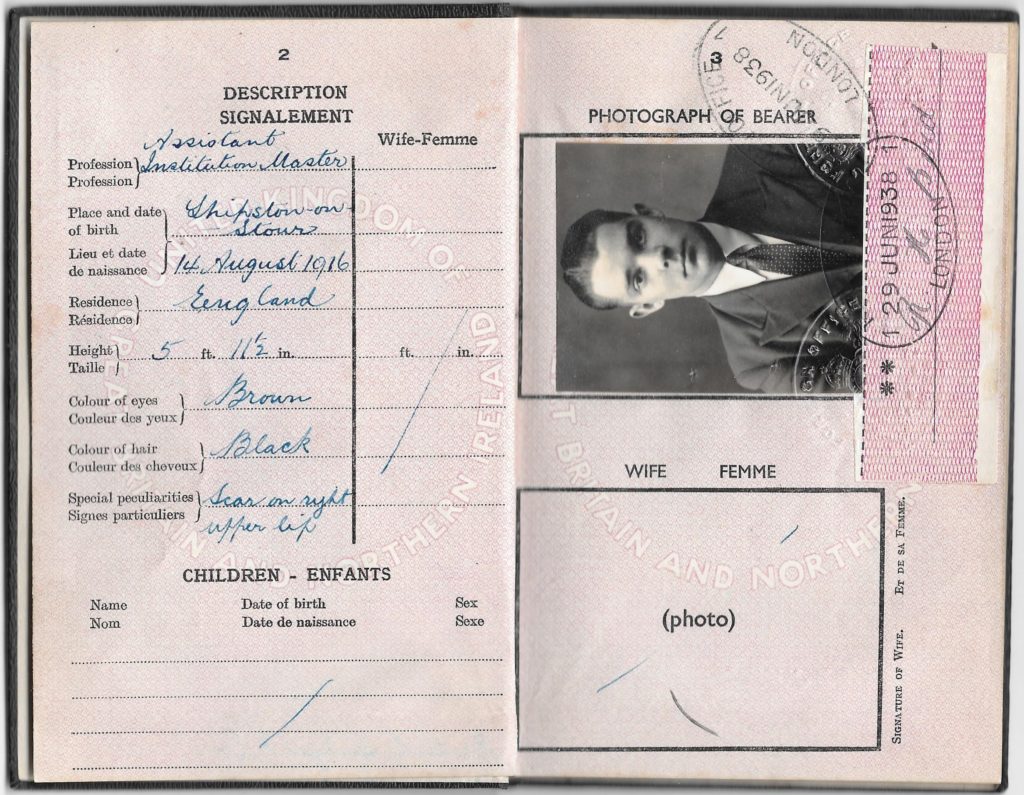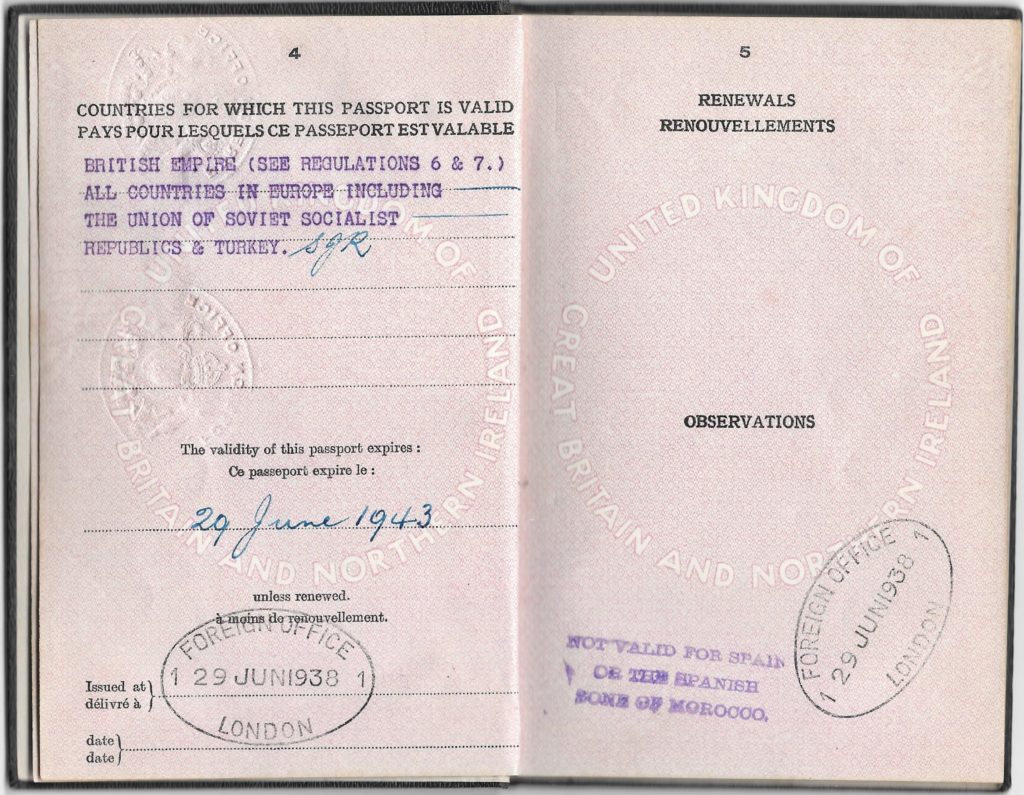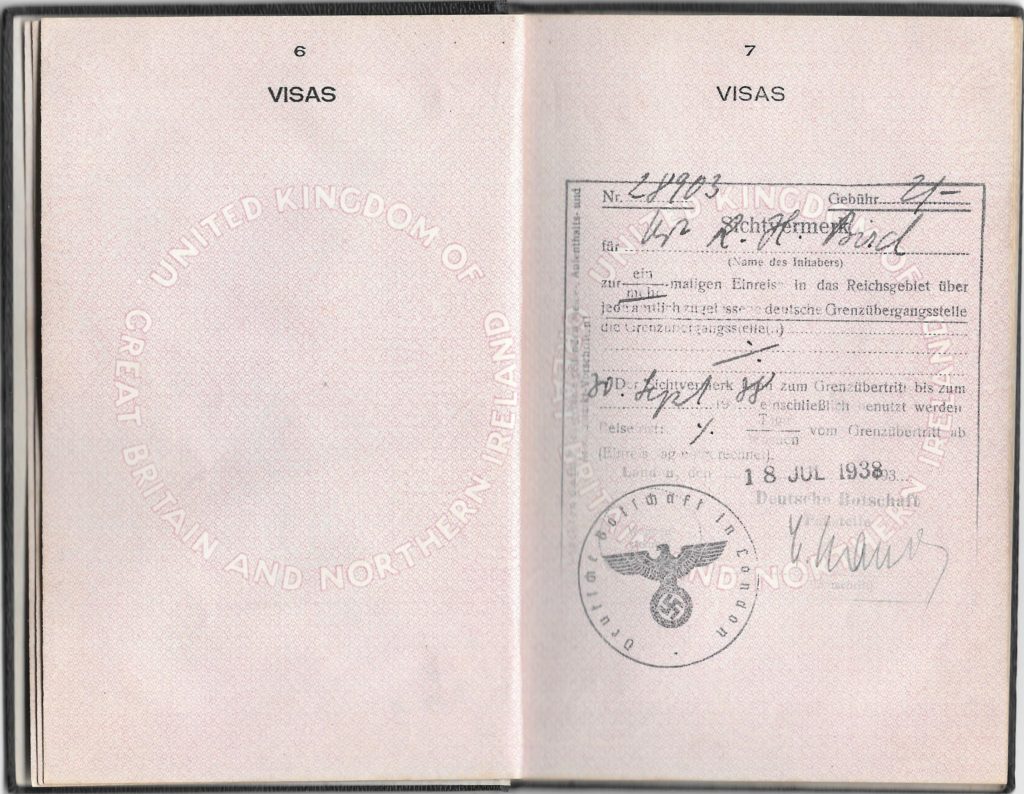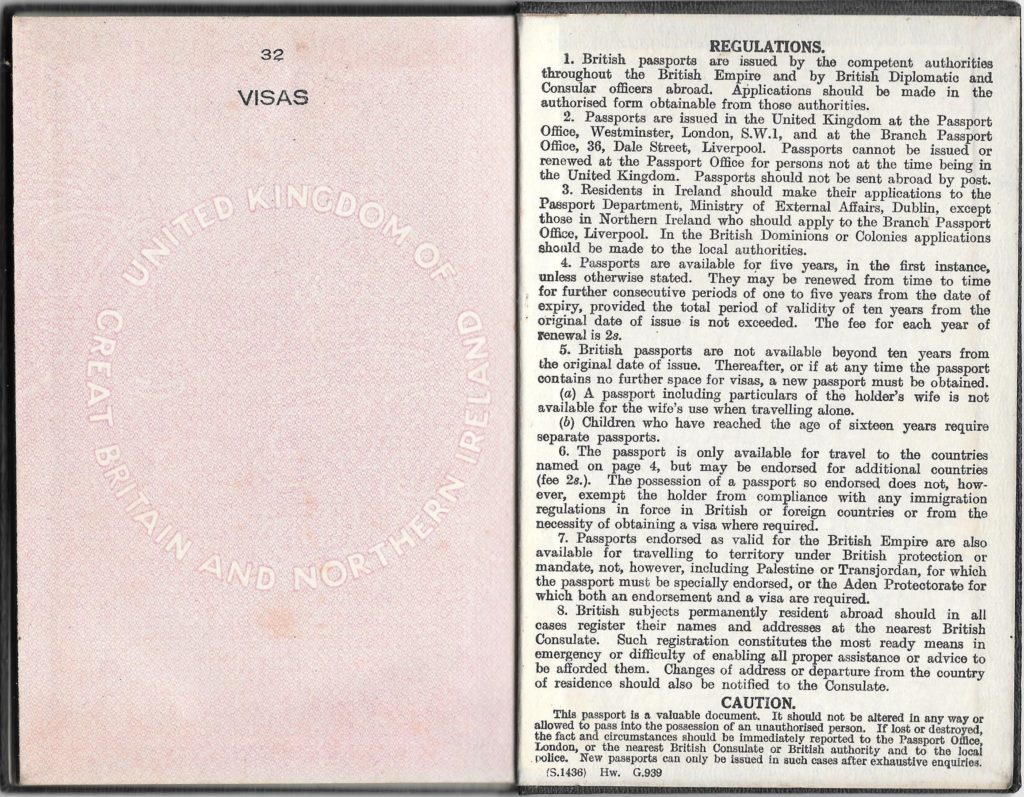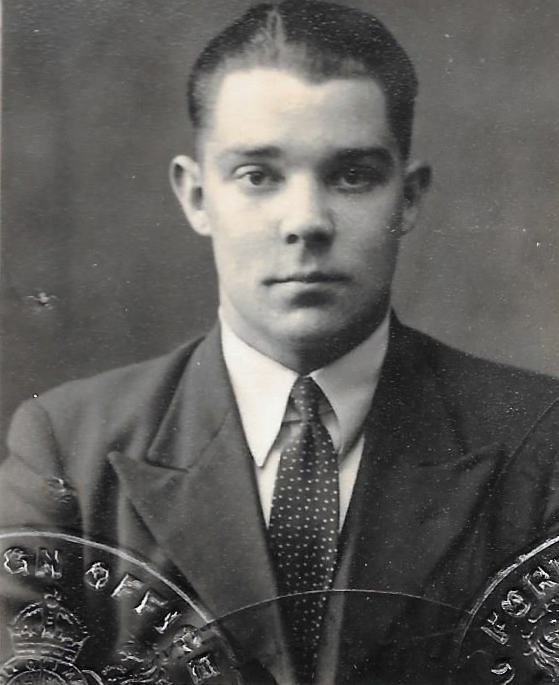 British passport. At the time, Reginald was serving as an Assistant Institution Master at the Warwick Union Workhouse, which had become known as Warwick Infirmary by 1930. Born in Shipston-on-Stour, Stratford-on-Avon, he travelled to Nazi Germany just a month later, in July 1938. Four years on, in July 1942, he married Winifred Margaret Kitt (1922–2005) at St. Germans, Cornwall. The couple had one son.
British passport. At the time, Reginald was serving as an Assistant Institution Master at the Warwick Union Workhouse, which had become known as Warwick Infirmary by 1930. Born in Shipston-on-Stour, Stratford-on-Avon, he travelled to Nazi Germany just a month later, in July 1938. Four years on, in July 1942, he married Winifred Margaret Kitt (1922–2005) at St. Germans, Cornwall. The couple had one son.
In July 1938, just weeks after receiving his passport, 22-year-old Reginald Harry Bird entered Nazi Germany. His visa, issued by the German Embassy in London and stamped with the swastika seal, reflects the uneasy and highly scrutinised nature of foreign travel in the months before war. As an Assistant Institution Master, his quiet journey into a dictatorship—only four months before Kristallnacht—remains historically intriguing, if ultimately undocumented.
I acquired Reginald’s original 1938 passport in October 2019:
Institution Background: Warwick Union Workhouse / Warwick Infirmary
By the 1930s, many Poor Law workhouses across Britain were transitioning into Public Assistance Institutions or infirmaries, following the Local Government Act 1929. This legislation formally ended the Poor Law Boards of Guardians and transferred their responsibilities to local councils.
-
The Warwick Union Workhouse, established in the 19th century, was part of this nationwide shift. By 1930, it had become Warwick Infirmary, with a dual role: caring for the poor and elderly, and operating as a public hospital.
-
The institution still housed a mix of elderly former inmates, the chronically ill, unmarried mothers, and others in need of long-term care, often in bleak, regimented conditions.
Job Title: Assistant Institution Master
Alternative titles in use at the time: Assistant Master, Deputy Superintendent, Second-in-Charge of Institution.Description of Duties:
As Assistant Institution Master, Reginald Harry Bird would have been the second-in-command to the Master (or Superintendent) of the institution. His role was both administrative and disciplinary, overseeing day-to-day operations and ensuring institutional order.
Typical responsibilities included:
-
Supervising staff and inmates across wards, dining halls, and work areas
-
Monitoring the daily routine, discipline, and welfare of residents
-
Keeping records of admissions, discharges, deaths, and supplies
-
Liaising with medical officers, nurses, and visiting inspectors
-
Overseeing domestic management, food distribution, and basic hygiene standards
-
Sometimes performing ward rounds, especially when senior staff were absent
-
Acting as Relieving Officer in emergencies (allocating emergency funds or support to destitute individuals)
Working Conditions:
-
Long hours, including early mornings and weekends
-
Often on-site accommodation within the institution, sometimes shared with the Master
-
High levels of bureaucracy and rigid rules
-
Little personal autonomy, especially under the older Poor Law ethos, though this was slowly modernising
-
Strong sense of hierarchy and duty, mixed with paternalism and growing medical professionalism
Qualification and Background:
While no formal qualifications were legally required at that level, many Assistant Masters were:
-
Experienced in institutional service or ex-military personnel
-
Educated to grammar school level or above
-
Trained on the job under senior officers or via apprenticeships in Poor Law institutions
-
Sometimes aspiring to become Institution Masters themselves
Transcription and Translation of Passport Page (Visa Page 6–7)
Name of Passport Holder: Reginald Harry Bird
Visa Issued: 18 July 1938
Issuing Authority: German Embassy (Deutsche Botschaft), London
Transcription of German Text (Page 7)
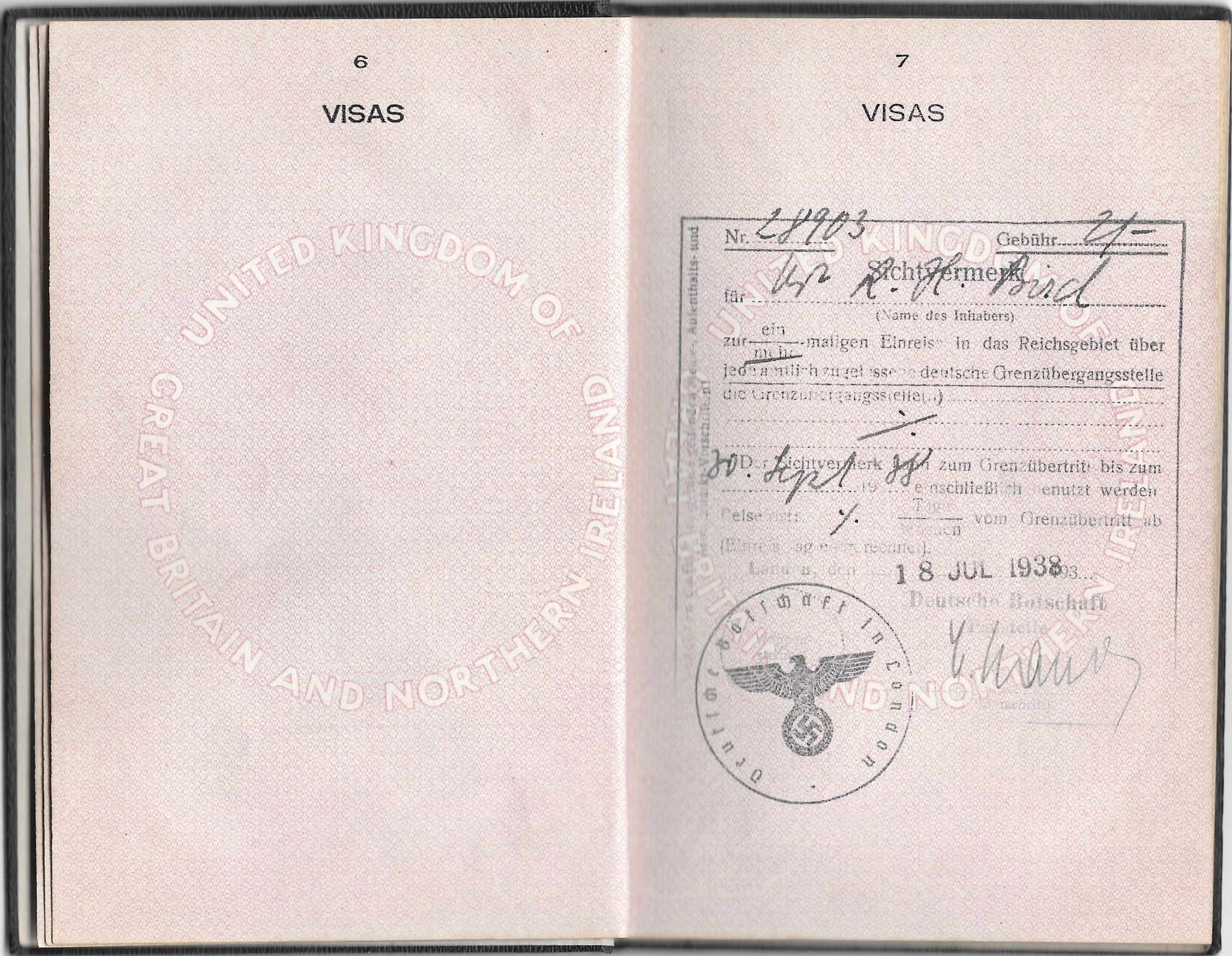
Nr. 24943
Gebühr: 2/6
Herr R. H. Bird
zur einmaligen Einreise in das Reichsgebiet über jede übliche deutsche Grenzübergangsstelle
die Grenzübergangsstelle.
500 Lichtdruck 27 321 zum Grenzübertritt bis zum
einschließlich benutzt werden
Reise-Nr. 7
18 JUL 1938
Deutsche Botschaft
(London)
[Stamp with Reichsadler and Swastika]
[Signature – illegible, possibly a consular officer]
🇩🇪 ➡️ 🇬🇧 English Translation
No. 24943
Fee: 2 shillings and 6 pence
Mr R. H. Bird
Permitted one-time entry into the territory of the Reich via any usual German border crossing.
500 photoprint 27 321 – valid for border crossing until [unspecified date] inclusive.
Travel no. 7
18 July 1938
German Embassy
(London)
[Official Stamp – Nazi Eagle with Swastika]
[Signed by German consular official]
Historical Context: A British Visitor to Nazi Germany in July 1938
In July 1938, the Nazi regime was firmly in power in Germany. Key contextual facts include:
-
Kristallnacht (the violent anti-Jewish pogrom) was just four months away (9–10 November 1938).
-
The Anschluss (annexation of Austria into Nazi Germany) had already taken place in March 1938.
-
The Munich Agreement, allowing Hitler to annex the Sudetenland, would be signed two months later in September 1938.
-
British-German relations were still officially diplomatic but under great strain. The policy of appeasement dominated British foreign policy, with PM Neville Chamberlain seeking to avoid war.
A British subject travelling to Germany at this time:
-
Might have been viewed with curiosity or suspicion, depending on the context.
-
Would have passed through a highly controlled and ideologically charged border system.
-
Needed a visa issued directly by the German Embassy, like the one shown here, even for a short visit.
-
Likely encountered heavy Nazi iconography, propaganda, and possibly military parades or restrictions, especially in cities like Berlin or Nuremberg.
-
Might have travelled for tourism, diplomacy, study, reporting, religious reasons, or—as in Reginald Harry Bird’s case—possibly educational, institutional, or personal curiosity.
Implications of Reginald Harry Bird’s Visit to Nazi Germany (July 1938)
1. Political and Intelligence Suspicion (on both sides)
In Germany:
-
British travellers were monitored. By 1938, the Gestapo and border officials closely tracked all foreign visitors.
-
Any connection to public institutions (like workhouses or hospitals) may have raised questions, particularly if he asked about social policy, mental health, or labour practices — topics tightly controlled under the Nazi regime.
-
If Bird showed curiosity about how German institutions operated (e.g. their Arbeitshaus or Heil- und Pflegeanstalten systems), he might have been quietly observed or reported.
In Britain:
-
Following his return, especially post-Kristallnacht (Nov 1938) and war declaration (1939), any visit to Germany — even brief — might be viewed with increasing suspicion.
-
The British security services (MI5) kept files on civil servants, teachers, and officials who had travelled to or had contact with Axis countries.
-
If Bird had remained in institutional service during the war, his passport visit might have been noted but not necessarily acted upon, unless he showed political sympathies or corresponded with Germans.
2. Security Implications (Personal and Institutional)
-
Institutional Risk: As an Assistant Institution Master, Bird held responsibility for vulnerable populations (elderly, mentally ill, poor). Any perceived ideological leanings (e.g. eugenics, fascism) could later cause concern within British public service circles.
-
Personal Safety in Germany: As a lone British traveller in a militarised Nazi state, Bird would have been under:
-
Visa scrutiny (as seen on the page)
-
Hotel registration and tracking (mandatory under Nazi law)
-
Prohibited from photography, asking questions, or deviating from approved areas
-
3. Why Was He There?
Given no evidence of political activity, it’s reasonable to suggest:
-
Touristic curiosity: Germany was a popular travel destination in the interwar years, with cheap exchange rates and grand architecture.
-
Institutional interest: As someone involved in British social care, he may have been curious about how Germany’s institutional systems worked — which, by 1938, were increasingly authoritarian and secretive.
-
Personal travel: He may have had no official reason beyond a personal trip, making this a snapshot of a young man abroad just before the world changed forever.
Post-Visit Consequences
-
No record suggests Bird was investigated or reprimanded.
-
He later married in 1942 and resumed normal civic life — suggesting no formal concerns were raised.
-
However, the historical curiosity of this visit — so close to the edge of war — adds weight to the archival significance of his passport and visa.

